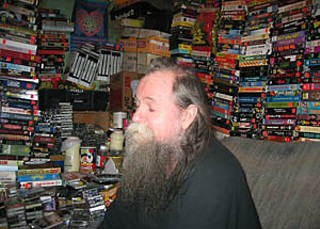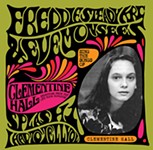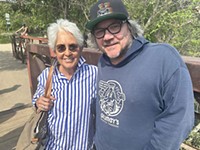Where the Pyramid Meets the High
Founding Elevator Tommy Hall and his horizontal thinking
By Joe Trybyszewski, Fri., Aug. 13, 2004

Tommy Hall, 62, lives in a run-down San Francisco residence hotel. His crowded room is decorated with cobwebs and Sixties posters. Stacked to the ceiling are cassettes and videotapes – not a CD in sight.
It's a stark and solitary image, but not necessarily a reclusive existence for the 13th Floor Elevators visionary; Hall's ex-wife Clementine keeps in contact and visits him regularly. He was interviewed by former Austinite Joe Trybyszewski, who first met Hall in 1966 when he wandered into an Elevators gig in Pease Park.
"There was beer, along with a big burlap bag full of cactus," recounts Trybyszewski. "No one cared who was who. The man I later became familiar with as Tommy Hall came up and said, 'Peyote's in the bag if you want, my friend.'"
The two met last winter during a series of meetings that reveal Hall to be as committed as ever to a quest of personal and human enlightenment, which includes a weekly dose of LSD. – Margaret MoserAustin Chronicle: The 13th Floor Elevators are known worldwide, and the story of Roky Erickson well told, but fans know very little about you. What have you been doing?
Tommy Hall: I've been working on my project, begun many years ago when I first started the Elevators. Long ago, I began researching the works of Korzybski and Gurdjieff. Korzybski was a Polish mathematician who proposed that mankind would be better served with a new way of processing thought and logic. He called it horizontal thinking. That's what I have been working on.
AC: This was mentioned on the liner notes of Psychedelic Sounds, wasn't it?
TH: Yes, I wrote those liner notes. That was almost 40 years ago, and I've gone much further than that. In fact, I'm currently preparing to put my research in writing. I'm not interested in the 13th Floor Elevators. My research has gone way past that. My mind is too mathematical.
AC: When did you first come to Austin and why?
TH: I was brought up in Tennessee. I came to Austin to go the University of Texas. I was a philosophy major at first when I studied Nietzsche, Gurdjieff, Korzybski, and others. I changed to a psychology major.
AC: Some of the songs you wrote for the Elevators were based on their teachings, weren't they?
TH: Exactly. In fact, I never was a musician of any sort. I knew these guys from Port Aransas who had a skiffle band called the Lingsmen. I can't remember them all, but Stacy Sutherland was their guitarist, and Benny Thurman played violin. It was a type of jug band or folk music. John Ike [Walton] was from Kerrville. His parents had a nice ranch where we practiced a lot. They didn't really need me, but we became friends, and they let me play the jug, but I wasn't that accomplished at it.
AC: What about the very early days of the Austin scene, places like the Ghetto?
TH: I don't really remember much about it. I think it was a place near Dirty Martin's hamburger stand that had cheap rent. It was an older apartment building, or maybe a group of them. The owners were relatively hip and weren't too concerned about what went on. We partied there but didn't live there.
Powell [St. John] lived there, I believe, for a time. So did Tary Owens, who was one of my best friends and the one who turned me on to Roky Erickson and his amazing voice. Gilbert Shelton lived there. He was a cartoonist for The Daily Texan and later started drawing cartoons for The Rag about three dope-smoking hippies, the [Fabulous] Furry Freak Brothers. The place had been around for years and was where beats lived during the Fifties. A lot of intellectuals, artists, and musicians lived there over the years.
AC: When did you first do LSD, Tommy?
TH: I won't answer that.
AC: How were the Elevators formed?
TH: Tary [Owens] had raved over Roky Erickson as a dynamic singer and asked me to go to the Jade Room with him one night. Clementine and I went with him, and Roky was indeed truly amazing. He was playing with some band called the Spades, and they had even cut a record with the song "You're Gonna Miss Me."
After the show, Tary introduced me to Roky, and we invited him over to our apartment. I told him I wanted to do what Dylan was doing, playing rock music but with serious lyrics. I told him about what I was learning with LSD, and he really became interested. He agreed to join me in forming a new rock group.
AC: How did the other original Elevators – Stacy Sutherland, Benny Thurman, John Ike Walton – get involved?
TH: The Lingsmen were never that serious of a band, so when I formed the Elevators, Stacy, Benny, and John Ike were very willing to drop the old band and start the new one. I never considered myself a musician and still don't. I was real interested, however, in introducing people to ideas and insights I was gaining through my use of LSD.
Everything I wrote was inspired through my taking LSD. I invented the electric jug totally out of my desire to find a place onstage with this new group, so I could be a part of it, and so I could communicate my new ideas through the lyrics I wanted to write.
AC: Do you communicate with Roky today?
TH: I can't talk much about Roky. I loved him as a musician but also as sort of a son. Roky was the greatest rock singer of all time. I miss seeing and talking to him but haven't done so for years. I don't like what happened to him. We got busted once for pot at our apartment, I believe, on 29th. We all got let off of that bust; I really don't remember why. But later we got busted again, and that, I believe, scared Evelyn, Roky's mom.
One day, Clementine and I went tripping with Roky, and Roky had some more acid with him. At some point, Roky wanted to go home. Clementine thought he should come down more off the acid before we dropped him off at his mom's, but Roky insisted it was cool. I agreed with Roky and we dropped him off. I regret that to this day.
We dropped him off. We didn't know what happened later that night. The next thing we knew, a day or so later, we found he was in, I believe, Austin State Hospital! Tary and I knew someone who worked at the hospital, and he left a door unlocked for us. We went there and broke Roky out.

I've heard he's doing much better. I would really like to see him.
AC: What about Stacy Sutherland?
TH: Stacy was a consummate guitarist, far ahead of his time. He had deep fears about his dying young under violent circumstances. This manifested itself as a deep, mysterious, soulful feeling in his music and gave the Elevators a profound base to our overall sound. His sense of impending doom was indeed prophetic. I know his death had something to do with his addiction to heroin. I won't talk about this any further, so don't ask me to.
AC: What about Benny and John Ike?
TH: I had a rule for the members of the band. No one could take speed or heroin. I was saddened to see Benny and John Ike both start down the path of doing speed. When they left the group, however, it was mostly by their own choice. I didn't try to keep them in the group. I was afraid they'd influence Roky to use speed.
AC: How did you and Roky compose your music?
TH: Roky would make up tunes, and I would put lyrics to them. If he made up a tune while away from me, he would put it on tape and give it to me.
AC: You're so self-effacing about your contributions to the Elevators. Surely you know fans around the world recognize you as the one who made the music special through your lyrics?
TH: I used the music to communicate my messages. That was my main interest. I was not a musician in any form. In fact, I invented my electric jug just so I would have a place onstage with the band.
AC: The band in its original form only made two complete albums.
TH: That's correct. Yet, I'm really pissed about the reissue of Easter Everywhere. That was as much of a concept album as Psychedelic Sounds, yet they remixed it and put the songs all out of sequence from the way I had designed and conceived it. It lost some of the intended meaning as a total album even though all of the music was still there.
AC: You didn't get paid much for your work. Many people blame International Records and more specifically your producer Lelan Rogers.
TH: Lelan Rogers was Lelan Rogers. He's dead now, anyway. I won't talk badly about the dead.
AC: You returned to San Francisco after going back to Texas and completing Easter Everywhere. What have you been doing since then?
TH: I spent a year or so living in the Haight. Clementine and I split up. She had stayed in San Francisco when we went back to complete Easter Everywhere and to go to court. She didn't want to take our son Roland out of school. She was a great mother and did not want to disrupt Roland's life. We grew apart. I went down to Laguna Beach and lived in the commune owned by the Brotherhood of Eternal Love. There was good, high-quality LSD there. I recommenced my research and have been continuing to do so here in San Francisco to this day.
AC: In 1985, I read about this research you've been doing, and you said then that you were preparing to put your findings in writing. Could you elaborate on what your studies have been and when you will complete your project?
TH: I've been working weekly on my search for the perfect sanity and truth of the universe. It has been very complex and turned out to be a lifelong endeavor. My studies have gone way beyond that now.
AC: Does it have anything to do with horizontal thinking and logic? Has this been the factor that caused such a long study? How is horizontal thinking accomplished?
TH: I could try to explain it, but my mind would revert to the pure mathematical state required for horizontal thinking. You will just have to wait until I put it in writing.
AC: Considering how well Roky is doing these days, would you ever consider collaborating again with him in writing new music, or perhaps joining him and other surviving members of the Elevators for a reunion?
TH: I'm really not interested in the 13th Floor Elevators at this time in my life. I'm just way past those times. I'm too busy with my research.
AC: In the song "Slip Inside This House," what are you trying to communicate? Was there a religious basis for this song, which refers to a "high baptismal flow"?
TH: Of course. There was a religious basis for everything I wrote. As for questions about my lyrics, I can only suggest people just listen carefully to them and get whatever they can. I have no interest in explaining them to anyone.
AC: Many of your fans want to know if you're hoarding some tapes of unreleased music. Many want to know if you will ever play the jug again. Where is your jug?
TH: I have no unreleased music or tapes. I lost my jug long ago. I'm not a musician and will never play the jug again.
AC: Most of us who used psychedelic drugs long since stopped doing so, yet there's still interest in them, as in what effect they had on us, good or bad. What do you think about psychedelics now?
TH: LSD provided us with the opportunity for a more truthful understanding of the universe, but most of the hippies missed it. It's a lot of work to accomplish this understanding.
Hippies misused it as a recreational drug. It's not a recreational drug. They did a lot of good things, wanting to make changes in society and bringing new insights and ideas into discussion, but the use of drugs as recreation led to their use of other street drugs like speed and heroin, which ruined many lives. There was no distinction made of that type of drug activity from the proper use of psychedelics.
Most people got caught up with illusions, failing to see truth provided by the psychedelic experiences. You must look past the pyramid, into its shadow, to find the truth.
This interview originally appeared on disc for the Internet discussion group www.groups.yahoo.com/group/TexasPsych.








